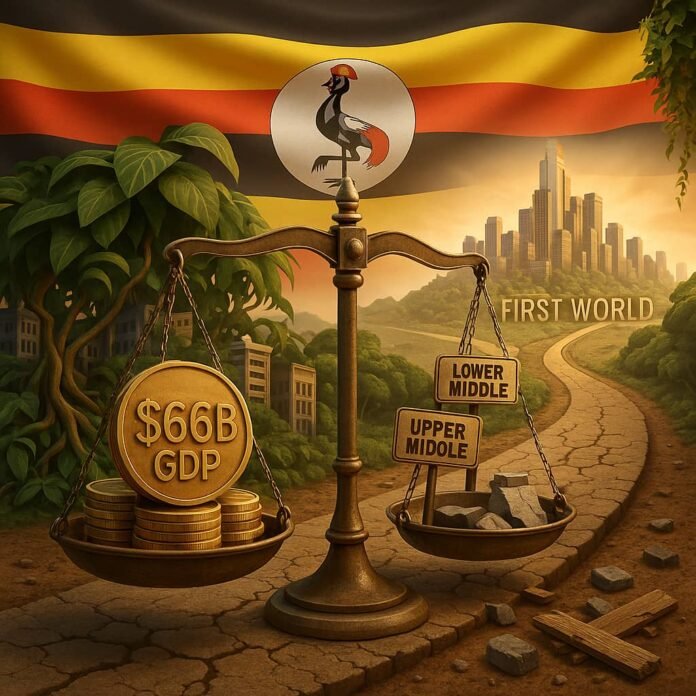By Isaac Christopher Lubogo
The nomination Pronouncement
At nomination Grounds, on this 23rd day of September 2025, President Yoweri Kaguta Museveni made a grand assertion. He declared that Uganda has graduated from the realm of least-income nations, through lower-middle income, now to “high middle income,” and is marching towards the “first world.” He told the nation that Uganda’s GDP has risen from $34 billion to $66 billion—a “doubling” in a single term.
The crowd, clothed in yellow, cheered. The banners screamed Protecting the Gains. But beneath the pomp, we must pause and ask: what are these “gains”? Are they Republican achievements or guerrilla trophies dressed in economic jargon?
GDP Arithmetic vs. Ground Truth
Museveni’s arithmetic paints a picture of a nation catapulted into prosperity. Yet the referee of global economics—the World Bank—records a different story:
World Bank places Uganda’s GDP at $53–54 billion (2024).
IMF projects ~$64 billion (2025)—a projection, not a confirmed reality.
In 2021, GDP was about $40 billion.
Yes, the economy has grown. But it has not doubled. Growth is real, but the “doubling” is a mirage, a political inflation of numbers.
Income Classifications: The Harsh Truth
Museveni’s claim of Uganda’s passage into “high middle income” collapses when tested against World Bank thresholds:
• Low-Income: GNI per capita of $1,135 or less
• Lower-Middle Income: $1,136–$4,465
• Upper-Middle Income: $4,466–$13,845
• High-Income: $13,846 and above
• Uganda’s latest GNI per capita: ~$1,073 (2024).
This means Uganda is still officially low-income, not even lower-middle, let alone upper-middle.
Thus, the nomination proclamation is a self-graduation without the examiner’s approval.
The Debt That Shadows Growth
While GDP numbers are paraded, another story lurks in the shadows:
Uganda’s public debt hit $32.3 billion in 2025, up 26% in just a year.
Debt-to-GDP ratio: ~51%, meaning over half the national income is shadowed by creditors.
Rising debt service is eating into the budget, leaving hospitals without drugs, schools without desks, and roads riddled with potholes.
So, while GDP is recited at Kololo, the ordinary Ugandan counts the missing medicine, the unpaid teacher, the collapsing bridge.
The Mirage of “First World”
To be “first world” (or high-income), Uganda needs per capita income of $13,846. Uganda stands at ~$1,073—a full order of magnitude away. To claim a trajectory to the first world is not vision, but rhetoric. It is the bush logic of gains: take one trench, declare the war won.
Bush Logic in Republican Clothing
Kololo was supposed to be a republican ground—where leaders renew the social contract with citizens. Instead, it has become a stage where the bush war never ended. The “gains” to be protected are not democratic dividends but spoils of continuity. The crowd is reminded not of their sovereignty but of the commander’s trophies.
The economy becomes another battlefield statistic: GDP as a bullet count, not bread on the table.
The Ordinary Ugandan’s Benchmarks
The farmer in Kamuli does not measure GDP, he measures the price of maize.
The boda rider in Kampala does not count GNI per capita, he counts daily fuel costs.
The mother in Gulu does not debate World Bank thresholds, she prays for Panadol at the health centre.
For them, the doubling of GDP is abstract. The doubling of school fees, of rent, of debt collectors’ calls—that is the reality.
Conclusion: Between Mirage and Reality
President Museveni’s nomination pronouncement was a performance of numbers, a tale of doubling, a march to the first world. But the evidence says otherwise:
Uganda has grown, yes.
Uganda has not doubled its GDP in one term.
Uganda is not lower-middle, upper-middle, or anywhere near first-world.
What today’s nomination speech offered was the bush logic of gains—a narrative where continuity is sold as progress, and statistics become weapons of persuasion.
But for the ordinary Ugandan, the truth is stark: growth without transformation is a mirage. GDP has risen in the books; poverty and debt have risen in the homes.








